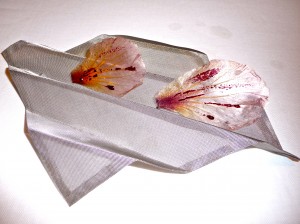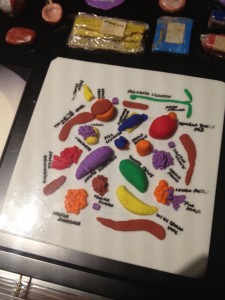El Bulli: Ferran Adria and the art of food
 Last week I went to the opening of this new exhibition at Somerset House. It’s a peculiar idea, an exhibition about a restaurant without anything to taste, and I have to admit I was sceptical. So what’s in the exhibition? Well, there is a lot of memorabilia: old photographs, menus and the like. But what I found more interesting were the explorations of the creative process at El Bulli: a display of multicoloured modelling clays that were used to make maquettes for every dish, so that the proportions of each ingredient, each colour, each texture, could be reproduced accurately in the restaurant; the display of custom-made serving vessels, including strange bits of mesh, and indented glass. And there were many small video screens showing films of the construction of El Bulli dishes, which were compelling. The exhibition certainly helps to stake Ferran Adria’s claim to be considered as a creative artist and not a mere cook – but it’s hard to convey s sense the magic and fun of El Bulli in a museum in London…
Last week I went to the opening of this new exhibition at Somerset House. It’s a peculiar idea, an exhibition about a restaurant without anything to taste, and I have to admit I was sceptical. So what’s in the exhibition? Well, there is a lot of memorabilia: old photographs, menus and the like. But what I found more interesting were the explorations of the creative process at El Bulli: a display of multicoloured modelling clays that were used to make maquettes for every dish, so that the proportions of each ingredient, each colour, each texture, could be reproduced accurately in the restaurant; the display of custom-made serving vessels, including strange bits of mesh, and indented glass. And there were many small video screens showing films of the construction of El Bulli dishes, which were compelling. The exhibition certainly helps to stake Ferran Adria’s claim to be considered as a creative artist and not a mere cook – but it’s hard to convey s sense the magic and fun of El Bulli in a museum in London…
One interesting moment: I was looking at a backlit display of thumbnail photographs of every dish created at El Bulli – an impressive tapestry of images, when I got chatting to a well-known British chef who had had a few glasses of wine. ‘I think it looks like an abortion!’ she told me. ‘Why?’ I asked. She said (as closely as I can remember): ‘This isn’t food. It’s got nothing to do with food, with the earth, with Spain, with what his grandmothers cooked. Ferran Adria has fucked it all up. Because now young people don’t want to learn how to cook, they want to learn to be like him. And he may do what he does brilliantly, but few others can. He’s fucked it all up.’
I have to say that I disagree with a lot of what she said. A fairly large part of Ferran Adria’s oeuvre is rooted in Catalonia – for example, his spherified olives and deconstructed constructed croquettes. But even if much of his cooking was wild and inventive, it doesn’t have to be an alternative to our grandmothers’ cooking. It’s an exploration of food and culinary culture, a game, an explosion of creativity, something marvellous and incredible – but no one in their right mind would want to eat his food every day. Real, earthy home cooking and Adria’s culinary pyrotechnics can coexist in a lively food culture.
On the other hand, I’ve heard  from friends in Barcelona that El Bulli has had a castastrophic effect on the younger generation of chefs, as this lady argued. Everyone, they say, wants to be a gastro-magician, a celebrity, a superstar. They want to invent and play – but they no longer want to learn the basic skills of Catalan cuisine.


5 Responses to “El Bulli: Ferran Adria and the art of food”
Isn’t that what happens? Certainly in my profession we talk about paradigm shifts, generally these are caused by a few young bucks reacting to what went before: throwing out what they didn’t like, taking inspiration from elsewhere and trying to make a name for themselves. For a while, they then set the agenda before they, in turn, get overturned.
In British dining culture, this seems to have happened on a roughly decadel basis recently: Cuisine Francais> Nouvelle Cuisine> Fusion Cuisine> ‘New British Cooking’. With hindsight you can see the themes and evolution. I’d suggest something similar is happening in Catalonia in Ferran Adria’s wake. I’d be surprised if it didn’t.
It will only be a matter of time when the old school, hearty, traditional, grand mother style, home cooked food comes back as trendy and authentic. It will move in cycles. I think the main point is they are both interesting and wonderful in there own respects – and as you said you wouldn’t want to eat at El Bulli everyday but it would be great for these styles to coexist.
I’m looking forward to going to the exhibition myself!
Isn’t this more of an issue of younger chefs don’t want to pay their dues and jump to the head of the line? Whether it’s traditional cooking or deconstructivist cuisine, a budding chef who wants to do the advanced stuff before s/he mastered the basic and intermediate skills is in the same boat.
And as for experimental gastronomy, Ferran has never claimed his food represents an entire genre or culture. He has always been clear that it is a specific subset of culinary offerings. Catalan cuisine reflects the broader cultural mentality of tradition co-existing with the trendy – I mean, look at Barcelona and Catalonia itself. It is wrong, and sorely limiting, of people to think what is Catalan can only be traditional.
Perhaps Ferran’s generosity of openly sharing all of his ideas is where the problem is: people don’t see that there is a definite foundational skill set that ought to be mastered before attempting certain maneuvers. That is like novice musician going to concert playing a complex piece from Mozart and people blaming Mozart for putting the composition out there.
As long as people are inspired to cook, there’s nothing wrong with experimentation and innovation – that’s the beauty of the culinary landscape, it is constantly changing and evolving. What I do find worrying is that, particularly in Chinese society, cooking is increasingly viewed as an unsophisticated, even demeaning activity, and traditional skills are lost.
Does El Bulli do takeout?